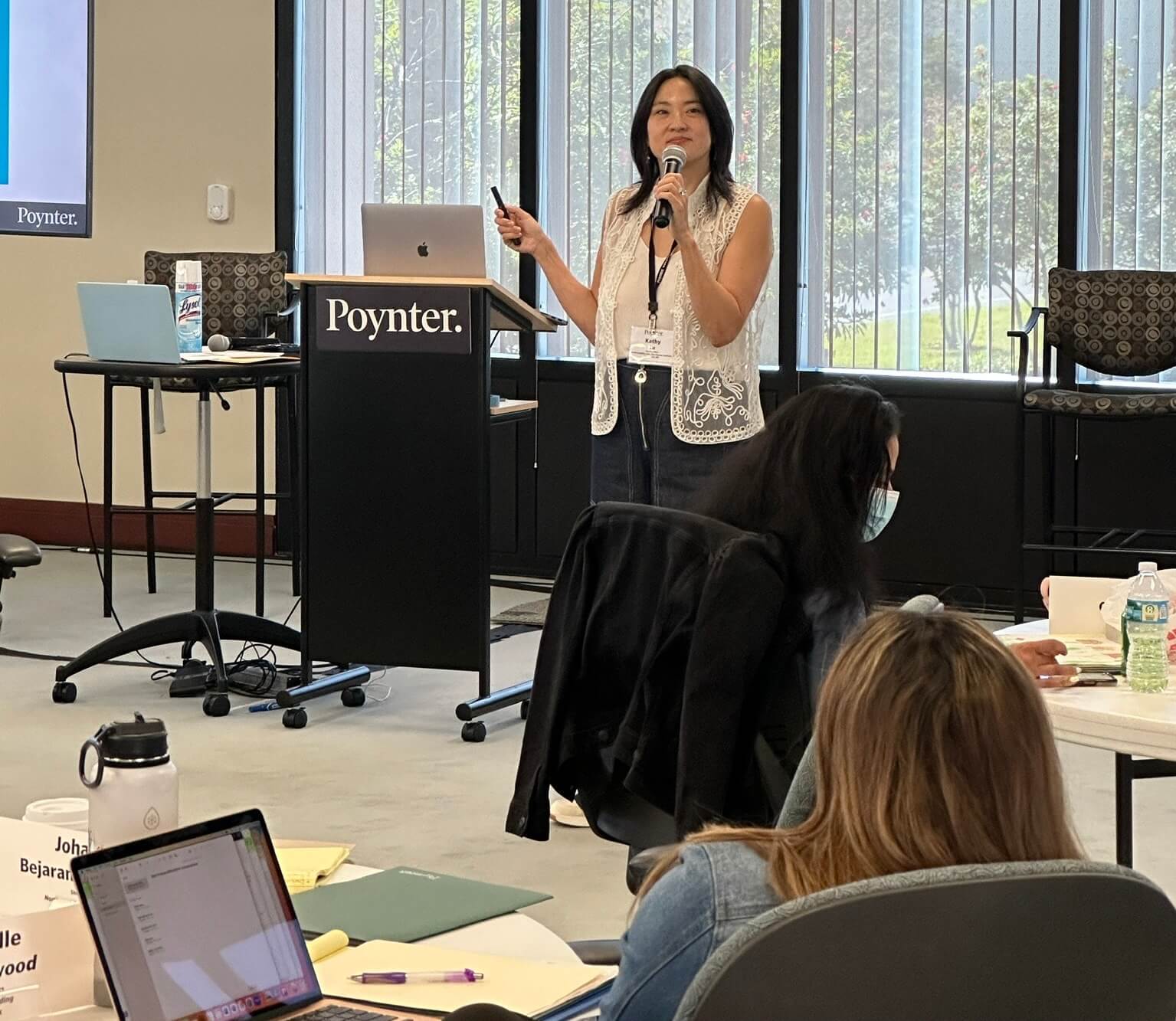This story is part of a series. You can read other stories from Some Personal News here.
No two days on the job are exactly alike for Noëlle Kachinsky.
Some days, she reviews photos and drafts of social media posts. On others, she interviews people and writes for her organization’s website. She keeps tabs on White House press briefings, assembles documents and copy edits manuscripts. She spends a lot of time thinking about how she can best present information to keep the public informed.
Her work centers on health, so that mission is especially important these days as the nation grapples with a major health crisis. Kachinsky is trying to ensure that people get the information they need to navigate the pandemic.
That job description might sound familiar to reporters. But Kachinsky is not a journalist — not anymore, at least.
Kachinsky is a health communications contractor working with the Centers for Disease Control and Prevention in Atlanta. She took the position last summer, leaving behind a 20-year career in broadcast journalism.
“We’ve never been through a pandemic before, and I thought it’s really important to keep serving people,” Kachinsky said. “Giving them coronavirus information on the news is one thing, but to really work with the agency that is doing the research and putting out those messages, I thought, was important.”
Kachinksy got her first job in television as a video editor while in college. After graduating, she worked at a station in her hometown in Green Bay, Wisconsin, for a couple years before heading south. She spent the next 15 years crisscrossing the South, working as a news producer, assignment editor, assistant news director and executive producer.
Her decision to leave journalism was not a sudden one.
“I have a thousand reasons why I decided to leave,” Kachinsky said. “I’d say the biggest thing was there was really nowhere else for me to go, or at least I felt that way.”
Media consolidation in recent decades has meant there are fewer companies to work for. In 2016, the five largest companies in local TV owned roughly 37% of local stations. Recent acquisitions have increased that percentage.
One of Kachinsky’s goals was to become a news director. But if she worked at a larger company, she would have to compete against a larger pool of applicants. She soon realized that she was unlikely to get a news director position, especially if she didn’t want to move and change companies every few years.
Another issue: the hours. Kachinsky has worked a lot of strange shifts during her career. Sometimes, she’d start work at midnight. Other times, she’d clock out at 2 a.m. Occasionally, she was expected to show up to daytime meetings after working an overnight shift. Trying to have a life on the weekends and spend time with loved ones during normal hours just made things worse. One week could bring three different sleep schedules.
She worked 20 years worth of holidays.
“You get into journalism because you want to keep people informed no matter what day it is,” Kachinsky said. “But personally, for me, it was important to spend time with my family while they’re still here.”
And then there was the pay. Kachinsky knew she was unlikely to significantly increase her salary if she stayed in journalism. The cost of living was going up about three times as quickly as her salary, so staying long term didn’t feel viable.
But the timing for leaving was never right. Kachinsky’s contracts were restrictive and meant leaving a job early would cost thousands of dollars in liquidated damages. Those contracts limited her ability to switch jobs and prevented her from making major life changes on her own terms.
The opportunity to work with the CDC came at the perfect time. Kachinsky was working as an executive producer at Spectrum in Charlotte, North Carolina, when she saw the job listing. It was a chance to use her skills to continue serving her community while learning something new.
“It’s been rewarding and interesting. You don’t realize how much you have to learn until you go do something else,” Kachinsky said. “I could do news like a robot with all that experience that I brought with me, but with the CDC, you have a lot to learn.”
Kachinsky’s specific assignments change depending on the contract company she works for, but she’s found that her journalism experience helped her with her new role. For example, she is able to help people at the CDC better understand what the media needs from them, and she can anticipate what questions might need to be answered.
In addition to all the transferable skills, Kachinsky has found another commonality between journalism and public health — the skeptics. Working during the pandemic has been challenging, she said, especially since things like masks and vaccines have been politicized.
“It’s difficult when some people don’t want to hear what you have to say or just plain think that you’re lying to them,” Kachinsky said. “But I also think it’s very rewarding because you know that you’re doing the right thing — helping people get information who might not otherwise have access to it or just answering questions that they may have.”
Though Kachinsky sometimes misses the excitement and unpredictability of journalism, she is happy with her decision to leave and has already applied to several full-time positions at the CDC. There’s always something new happening in public health and more to learn. She’s back to working normal hours, giving her time to relax and see friends and family. For the first time in years, she has time to watch prime-time TV.
Working in public health also allows her to do something about an issue she cares about — health inequity. The pandemic has disproportionately affected certain groups, who also face issues of inadequate and inaccessible health care. Public health, Kachinsky said, is important in helping bridge some of those inequities.
“I really wanted to do something where I felt like my work was valued, I was serving people and doing something I thought was needed,” she said. “I realized I don’t necessarily have to work in news to use the ability to write or communicate or lead people. I can do that in other businesses.”
This story is part of a series, Some Personal News, that shares experiences of people who were laid off from their journalism jobs or left the news during the pandemic. We know thousands of people lost their jobs last year, and want to capture the stories of journalists, printing plant employees, ad sales people, news researchers and anyone else whose employment by newsrooms ended or was altered because of the pandemic. You can tell us your story here.







